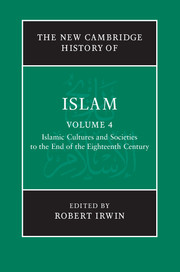Book contents
- Frontmatter
- Introduction
- PART I RELIGION AND LAW
- 1 Islam
- 2 Sufism
- 3 Varieties of Islam
- 4 Islamic law: history and transformation
- 5 Conversion and the ahl al-dhimma
- 6 Muslim societies and the natural world
- PART II SOCIETIES, POLITICS AND ECONOMICS
- PART III LITERATURE
- PART IV LEARNING, ARTS AND CULTURE
- Glossary
- Bibliography
- Index
- References
3 - Varieties of Islam
from PART I - RELIGION AND LAW
Published online by Cambridge University Press: 28 March 2011
- Frontmatter
- Introduction
- PART I RELIGION AND LAW
- 1 Islam
- 2 Sufism
- 3 Varieties of Islam
- 4 Islamic law: history and transformation
- 5 Conversion and the ahl al-dhimma
- 6 Muslim societies and the natural world
- PART II SOCIETIES, POLITICS AND ECONOMICS
- PART III LITERATURE
- PART IV LEARNING, ARTS AND CULTURE
- Glossary
- Bibliography
- Index
- References
Summary
The Prophet Muḥammad laid the foundations of a new religion which was propagated as the seal of the great monotheistic religions of the Abrahamic tradition. However, the unified and nascent Muslim community (umma) of the Prophet’s time soon divided into numerous rival factions, as Muslims disagreed on a number of fundamental issues. Modern scholarship has indeed shown that at least during the first three centuries of their history, marking the formative period of Islam, Muslims lived in an intellectually dynamic and fluid milieu characterised by a multiplicity of communities of interpretation, schools of thought and a diversity of views on a range of religio-political issues. The early Muslims were confronted by many gaps in their religious knowledge and understanding of Islam, which revolved around major issues such as the attributes of God, the nature of authority and definitions of believers and sinners. It was during this formative period that different groups and movements began to formulate their doctrinal positions and gradually acquired their distinctive identities and designations. In terms of theological perspectives, diversity in early Islam ranged from the stances of those, later designated as Sunnῑs, who endorsed the historical caliphate and the authority–power structure that had actually emerged in the Muslim community, to various religio-political communities, notably the Shῑʿa and the Khārijites, who aspired towards the establishment of new orders and leadership structures.
- Type
- Chapter
- Information
- The New Cambridge History of Islam , pp. 105 - 141Publisher: Cambridge University PressPrint publication year: 2010

